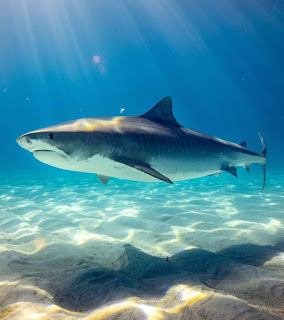They get their name from the enormous electrical charge they can generate to stun prey and dissuade predators. Their bodies contain electric organs with about 6000 specialised cells called electrolytes that store power like tiny battery. When threatened or attacking pray this cells will discharge simultaneously emitting a electrical charge of at least 600 volts.
Subscribe to:
Post Comments (Atom)
How do Sharks identify their prey?
Sharks have electro reception, which is a keen sensitivity to electrical impulses. As fish swim around, their movement sends tiny electrical...

-
Bulls have no reaction towards any colour as they are actually colour blind. The red colour of the cape used during a bull fight is a matter...
-
Why are Jackals noisy? Jackals are noisy because they communicate with each other by a screaming yell and yapping or a siren like howl when ...
-
A shark’s pectoral fins cannot bend upwards like a fish, limiting its swimming ability to forward motion. Unlike fish, sharks cannot stop su...




No comments:
Post a Comment